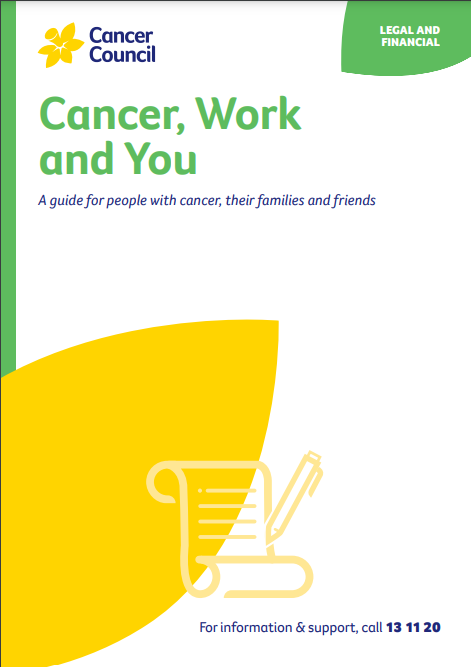- Home
- Cancer Information
- Practical concerns
- Cancer, work and you
- For workers
- Working during treatment and recovery
- Leave entitlements
Leave entitlements
There are several types of leave options available to help you balance work and treatment.
Learn more about:
Overview
The National Employment Standards outline the rules for leave under most awards or enterprise agreements. Typically, paid leave is only available to full-time and part-time employees, not casual or seasonal employees. But most casual employees can take 2 days of unpaid personal, compassionate or carer’s leave at a time.
Entitlements offered under awards or agreements may be different, but can’t be any less than the National Employment Standards. Check the terms of your agreement for what leave you can take. Learn about the different types of leave.
Tips for managing your leave
- Paid annual and personal leave starts building up from your first day of work. If you are a new employee, ask your manager or HR department if there is a waiting (qualifying) period for paid personal leave.
- Give as much notice as possible before applying for or taking leave.
- Combine personal leave with annual leave and long service leave if necessary.
- If you don’t have enough paid leave, ask your manager if you can take unpaid time off.
- Check with your employer if you can “cash out” your annual leave and any conditions that may apply. Some awards and agreements don’t allow this.
- Know your rights. It is generally against the law to dismiss someone for taking leave for an illness.
- If you think that your employer isn’t giving you the correct amount of leave, check your entitlements. Contact the Fair Work Ombudsman on 13 13 94.
→ READ MORE: Types of leave entitlements
Podcast for people affected by cancer
Listen now
More resources
Brooke Russell, Principal Occupational Therapist, WA Cancer Occupational Therapy, WA; Bianca Alessi, 13 11 20 Consultant, Cancer Council SA; Dr Prunella Blinman, Medical Oncologist, Concord Cancer Centre, Concord Repatriation General Hospital, NSW; James Chirgwin, Physiotherapist, The Wesley Hospital, QLD; Danielle Curnoe, Consumer; Simon Gates, Barrister, Tasmanian Bar, TAS; Justin Hargreaves, Medical Oncology Nurse Practitioner, Bendigo Health Cancer Centre, VIC; Kaylene Jacques, Director, People and Communications, Cancer Council NSW; Alex Kelly, Senior People Attraction Advisor, Human Resources, Allianz Australia Insurance, NSW; Legal reviewer; Georgina Lohse, Social Worker, GV Health, VIC; Lesley McQuire, Consumer, Cancer Voices NSW.
View the Cancer Council NSW editorial policy.
View all publications or call 13 11 20 for free printed copies.
Need to talk?
Support services
Coping with cancer?
Speak to a health professional or to someone who has been there, or find a support group or forum
Need legal and financial assistance?
Pro bono services, financial and legal assistance, and no interest loans
Cancer information
Dealing with the diagnosis
Common reactions to a cancer diagnosis and how to find hope
Resource hub
Guides, fact sheets, videos, podcasts and more for people with cancer, their families and friends

